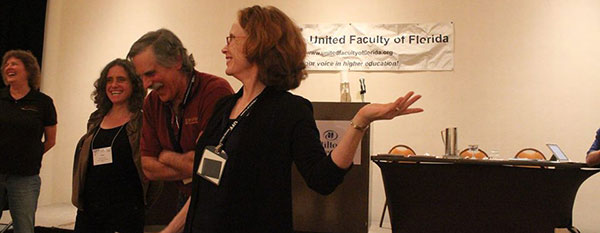We need YOU to get involved!
The success of our UFF chapter—and our campus—depends on the service of faculty members. We need YOU to get involved! There are 3 types of leaders in UFF-FSU:
- Volunteers: Department Stewards and Committee Members
- Elected Leaders: Officers and UFF Senators, who all serve on the FSU chapter Executive Council (EC), plus FEA Delegates
- Appointed Leaders: Committee Chairs
There can be overlap, such as an elected leader who also leads a committee and serves as a steward. The important thing is that there is a role for everyone, no matter how much time you have to give.

Department Stewards
Each department steward serves as a vital connection between their department and the Executive Council. Stewards communicate important news, talk to their colleagues about membership, and report specific departmental issues and questions to the EC. Stewards are integral to the union because they are the most effective in communicating with their in-unit colleagues.

Committees
Serving on a committee is a low-pressure way to learn the ropes and contribute to the success of our union. Committee Chairs are appointed by the chapter President and confirmed by the Executive Council. Committee Members can simply volunteer. The specific responsibilities and time commitments will vary based on the committee.
Our committees include:
- Membership (includes organizing and social activities)
- Bargaining
- Government Relations
- Contract Enforcement (formerly known as Grievances)
- Communications (includes website maintenance)
- Academic Affairs
- Elections
- Recognition

Senators & Delegates
A Senator’s primary duty is to serve the Executive Council of our chapter (more below), but Senators are also invited to attend biannual statewide UFF meetings, one online and one in person. FEA Delegates must attend the FEA Delegates Assembly, which meets once a year in the Fall. The decisions made at the UFF and FEA assemblies help change the rules and regulations that govern our statewide unions. Both assemblies are typically held in either Tampa or Orlando; travel and hotel rooms are paid for by UFF.
Duties of a Senator
UFF-FSU Senator Duties
Senators must attend monthly hour-long Executive Council meetings in person or via Zoom, and are expected to attend the biannual statewide meetings. Discussions at our monthly chapter meetings and our semi-annual statewide meetings are wide-ranging and include issues that affect us all. Senators have a strong voice as we decide the issues to bring to the bargaining table and how to best advocate for our positions. By participating in these discussions and by getting involved in committee work, Senators do important work in representing the interests of faculty members.

Executive Council
The Executive Council (EC) is made up of elected Senators, elected Officers, and appointed Committee Chairs. The EC steers the chapter, makes budget decisions, meets with University officials, plans events, oversees membership and outreach efforts, and determines legislative priorities. It’s our goal to have the most diverse representation possible on the EC. We have tenured and specialized faculty from a variety of disciplines. Serving on the EC is one of the best ways to learn more about the union and develop the experience to be an effective leader for your colleagues.
Duties of the President
UFF-FSU President Duties
The UFF President’s first responsibility is to the members, ensuring the Chapter is fairly representing them and supporting their issues.
The President is not charged with executing all the office’s responsibilities on their own and typically finds volunteers to help and to chair subcommittees of the Executive Council. The President is an ex officio member of all standing committees but is not required to attend all meetings. Specific tasks below are organized into those that are external-facing and those that are faculty-facing.
External-facing roles
The President is the public face of the union and is the person who speaks to external constituents such as the press, legislators, University leaders, UFF state leaders, the UFF Executive Director, and potential allies such as other unions or community groups. Some of these responsibilities can be delegated to a skilled and reliable volunteer.
- The Tallahassee Democrat. A reporter is typically assigned to the FSU beat, and that person in the past has sometimes been an ally. In any event, the President or designated representative must be available to give comments on matters of concern to faculty. On occasion, the President initiates contact with the reporter to provide news or suggest a story.
- Legislature. The President or designated representative should be available to testify before legislative committees and also should establish contacts with individual legislators on matters of interest to the union. In conjunction with the UFF state office, the President mobilizes faculty for lobbying initiatives.
- University Administration. Consultations with the FSU President and FSU Administration are mandated in the contract for twice a term and once in summer. The President confirms that the team will attend and coordinates with Administration and team members to set Consultation dates (or delegates someone to do this secretarial task). The President prepares the agenda and sends it to the Administration at least a week in advance, as per the CBA, and coordinates with team members to be sure agenda items are assigned for presentation at the meeting.
- UFF State Duties. The President must attend statewide UFF Senate meetings, including Chapter Presidents’ meetings as scheduled in conjunction with the full Senate meeting..
- The President must also attend the monthly Council of Presidents scheduled by the UFF state office.
- Membership. The President or a designated representative must assure that membership forms and quits are processed.
- Course Releases. The President assigns course releases for eligible Executive Council members for Spring, Summer and Fall and notify HR by the dates specified in Article 3.4 of the CBA.
Faculty-facing roles
- Works with the Communications Chair to assure maintenance of the UFF-FSU web site, which entails posting new content when appropriate and maintaining old material in the archives.
- Delegates someone to maintain the listserv, which involves adding new faculty to the Bargaining Unit email list, removing people who request to be removed, and adding new members to the Members email list.
- Reports monthly to the FSU Faculty Senate about what is transpiring in bargaining or other matters. If the President must miss a meeting, s/he can delegate this function to a VP or someone else.
- Presents a 5-10 minute slideshow at the New Faculty Orientation every August.
- Works with the Executive Council to identify speakers to attend members’ luncheons or other social events.
- Arranges a luncheon at the Florida High (FSUS) before classes start there (around August 10-15), collaborating with one or two FSUS activists.
- Annual faculty survey. The President or a designated representative works with the Executive Council to create questions, seek feedback, and send the survey to the Bargaining Unit. The next step is for the President or designated representative to tabulate results, analyze them, and disseminate them.
- Works with the Treasurer and the Executive Council to draft the annual budget.
- Creates and send in advance the Agenda and preside over monthly Executive Council meetings
- Organizes or delegates someone to organize monthly “Fourth Friday” or other social events.
- Offers Bargaining support. The President is an ex officio member of the Bargaining Team and although not required to attend every meeting, should be aware of what is happening. The President’s function is to provide input to the Bargaining Team based on his or her take on how faculty may respond.
- Stays in regular touch with the Membership Committee via email or other forms of communication to assure that they are appropriately informed about various matters of interest.
Duties of the Vice-Presidents
UFF-FSU Vice-President Duties
The duties of the Vice-Presidents are prescribed by the Executive Council. If the President is absent or temporarily unable to serve, the Executive Council votes to choose one of the two Vice-Presidents to serve as Acting President.
Duties of the Secretary
UFF-FSU Secretary Duties
The Secretary takes minutes at each monthly meeting, distributing them to the Executive Council before the next meeting (and soliciting changes) and making any changes that come in.
The Secretary is obligated to attend almost all meetings. When they can’t attend, they should notify the President in advance to allow a note-taker to be found at the beginning of the meeting.
A new Secretary should model the Minutes on those of the previous Secretary. Minutes are light on details. Hence, reports on Grievances or details of Bargaining are summarized as simply having happened.
Duties of the Treasurer
UFF-FSU Treasurer Duties
The Treasurer collects documentation pertaining to disbursements for various union expenses (travel reimbursements, bargaining expenses, membership drive expenses, etc.). The Treasurer maintains such documentation, subject to IRS document-retention requirements. Prior to every monthly Executive Council meeting, the Treasurer sends to Executive Council members a budget and ledger report (in Excel) and the bank statement. The Treasurer also completes a segment of a report that is compiled and sent annually by the Chapter President to the UFF state office. The full report shows that our Chapter is in compliance with certain requirements. The Treasurer must ensure that necessary tax documentation is filed each year for the calendar year 1/1-12/31, typically due by May 15.
Duties of a Senator
Senator Duties
Senators must attend monthly hour-long Executive Council meetings in person or via Zoom. Senators are also invited to attend the biannual statewide meetings, one online and one in person. Discussions at our monthly chapter meetings and our semi-annual statewide meetings are wide-ranging and include issues that affect us all. Senators have a strong voice as we decide the issues to bring to the bargaining table and how to best advocate for our positions. Senators also have the opportunity to chair committees and should consider participating in committees. By participating in these discussions and by getting involved in committee work, Senators do important work in representing the interests of faculty members.
